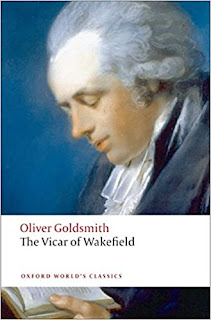The Vicar of Wakefield
Another
short novel on the List, no complaints from me. At this size I am quickly progressing,
and this will be my 10th book this year and number 40 on the List.
“The Vicar
of Wakefield” by Oliver Goldsmith is one of those novels I have heard of as
something everybody are supposed to know, but I never read it or even knew what
it is about. Apparently, it is a famous classic and in my research I found that
it was already made into a movie in 1910!
It is a
about a vicar (a priest of sorts) who start out comfortably wealthy with a
pleasant parish and a nice, big family. Then, right away misfortune strikes leading
into what becomes a continuous deroute. His fortune is gone as the merchant with
whom he placed his fortune disappears. He enters into a silly debate about clergy
remarrying which estranges him from his friend Wilmott, whose daughter was supposed
to marry the vicar’s eldest son and eventually the vicar with family is forced
to remove to a remote parish and make a new beginning, this time much poorer.
They are
befriended by the friendly, but poor has-been gentleman Mr. Burchell, and the
local squire Mr. Thornhill, an infamous libertine. Burchell likes the vicar’s second
daughter, Sophie, while Thornhill woos the elder Olivia. Blissful poverty does
not last long. The vicar is ripped off by frauds, Olivia is kidnapped by
Thornhill info a fake marriage and George, the eldest son, is adrift on the
continent with no money. Accidents stack up until the vicar is in debt prison
with half his family dead or dying.
All through
this the vicar is sanguine and praise himself for having the best treasure, his
family, around him, so things are not so bad.
“The Vicar
of Wakefield” is at face value a simple story about misfortune and recovery for
all the good guys. Nothing terribly special there. As far as I can tell its
fame is due to two elements:
1. Oliver Goldsmith makes a lot out the
homeliness of domestic life at the vicar’s. This was apparently new at the time
and had so charming effect that it got loved for this alone
2. Hidden beneath the simplistic
surface “The Vicar of Wakefield” is a satire on many contemporary institutions
and issues. Legal, politic, religious and moral themes are all commented on in
the many digressions of the story and always innocently by the naïve vicar who
has no clue what a hornets nest he is stirring.
More
importantly, there is a satire in the very structure of the novel. By being a
good and moral person, the vicar gets cheated, injured and persecuted by all the
evils his lifestyle is supposed to protect him from. A defunct legal system
consistently lets him down. A nepotistic nobility can get away with anything, debauchery,
violence, theft and fraud, with impunity. A reader unhappy with contemporary
conditions in Britain could in all the vicar’s trouble find plenty of
ammunition. Even the conclusion has so many coincidences happening all at once
that the incredulity of it becomes an attack in itself. With the cards stacked
against him there is no way the vicar can get out of this mess by himself and
it takes a massive amount of intervention to set things right. Essentially
saying that as things are, trouble comes easy, recovery takes magic.
It was a
pleasant read and I was quite entertained. Despite his many digressions,
Goldsmith did not waste time but drove the story forward and so it remained
interesting throughout. Only one thing puzzles me: In the conclusion it is discovered
(spoiler!) that Olivia’s marriage contract is not fake after all, so she is
still married the vile Mr. Thornhill. This she is congratulated upon as she is
no longer a fallen woman… ehhh, why is it a good thing that she is married to a
terrible man instead of being free of him? Having lost everything what sort of
bitter revenge will she have to endure from his hand and why is this good?
Maybe the times are simply different, but if anybody can help me understand, I
would be much obliged.
A
recommendation from me.


